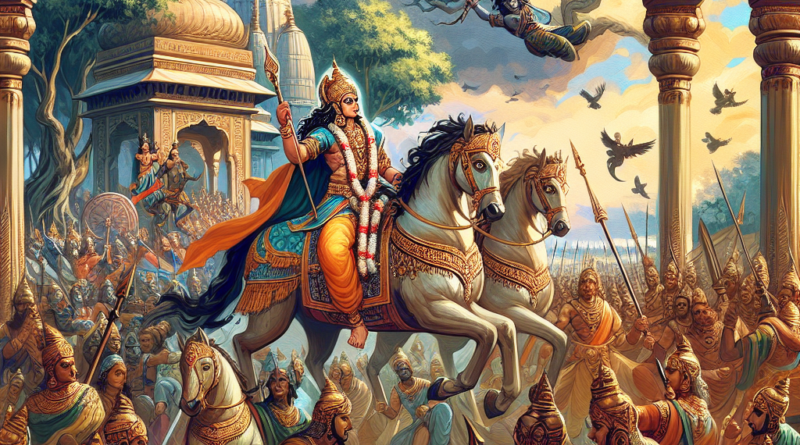Tragic Hero: The Untold Tale of Karna
Title: The Enigmatic Hero: Exploring the Story of Karna in the Mahabharata and its Cultural Significance in Hindu Mythology
Introduction:
The Mahabharata, one of the most revered and epic scriptures in Hindu mythology, is a treasure trove of timeless tales and moral lessons. Among its many characters, one stands out for his unwavering loyalty, resilience, and tragic fate – Karna. The story of Karna, the noble warrior with a tragic past, holds great cultural significance in Indian history and Hindu mythology. This article delves into the historical context, narrative, and contemporary relevance of Karna’s story, shedding light on its enduring impact on Indian culture and society.
Historical Context:
The Mahabharata, believed to have been composed between 400 BCE and 400 CE, is a rich tapestry of narratives that revolve around the Kurukshetra War between the Pandavas and the Kauravas. Karna, born to Kunti before her marriage to King Pandu, is the half-brother of the Pandavas. Despite being raised as a charioteer’s son, Karna displays exceptional skills in archery and becomes a formidable warrior. His unwavering loyalty towards Duryodhana, the eldest Kaurava, shapes his destiny and plays a pivotal role in the epic battle of Kurukshetra.
Narrative of Karna:
Karna’s story is a poignant tale of identity, loyalty, and sacrifice. Rejected by his mother Kunti and deprived of his royal lineage, Karna faces numerous challenges and injustices throughout his life. Despite his noble qualities and valiant deeds, societal prejudices and personal tragedies haunt Karna at every turn. His generosity, valor, and sense of honor earn him admiration even from his enemies, yet his tragic fate looms large as he grapples with his inner turmoil and conflicting loyalties.
Karna’s character embodies the complexities of human nature – his inner struggles, moral dilemmas, and unwavering principles resonate with audiences across generations. His tragic end on the battlefield, betrayed by fate and abandoned by allies, evokes a sense of pathos and admiration for his unwavering commitment to his principles till the very end.
Cultural Significance:
The story of Karna holds profound cultural significance in Indian history and Hindu mythology. Karna’s virtues of loyalty, valor, and sacrifice exemplify the ideals of dharma (righteousness) and karma (action) that are central to Hindu philosophy. His unwavering commitment to his principles, despite facing numerous adversities, serves as a moral compass for individuals navigating the complexities of life and relationships.
Karna’s character also challenges societal norms and prejudices, highlighting the importance of empathy, compassion, and inclusivity in a diverse and stratified society. His struggles against discrimination and injustice resonate with marginalized communities and individuals striving for recognition and equality in contemporary times.
Contemporary Relevance:
The story of Karna continues to inspire and resonate with audiences in contemporary times, reflecting universal themes of identity, loyalty, and redemption. In a rapidly changing world fraught with moral ambiguity and ethical dilemmas, Karna’s unwavering commitment to his values serves as a timeless example of integrity and resilience in the face of adversity.
In popular culture, Karna’s character has been reimagined and celebrated in various forms, including literature, theater, and television. His story serves as a reminder of the power of storytelling and mythology in shaping cultural identity and fostering moral values in society.
Conclusion:
The story of Karna in the Mahabharata is a testament to the enduring power of myth and legend in shaping cultural beliefs and values. His character, imbued with nobility, valor, and sacrifice, continues to captivate audiences and offer profound insights into the human condition. As we navigate the complexities of contemporary life, Karna’s story serves as a guiding light, reminding us of the importance of staying true to our principles and embracing the inherent beauty of our shared humanity.

